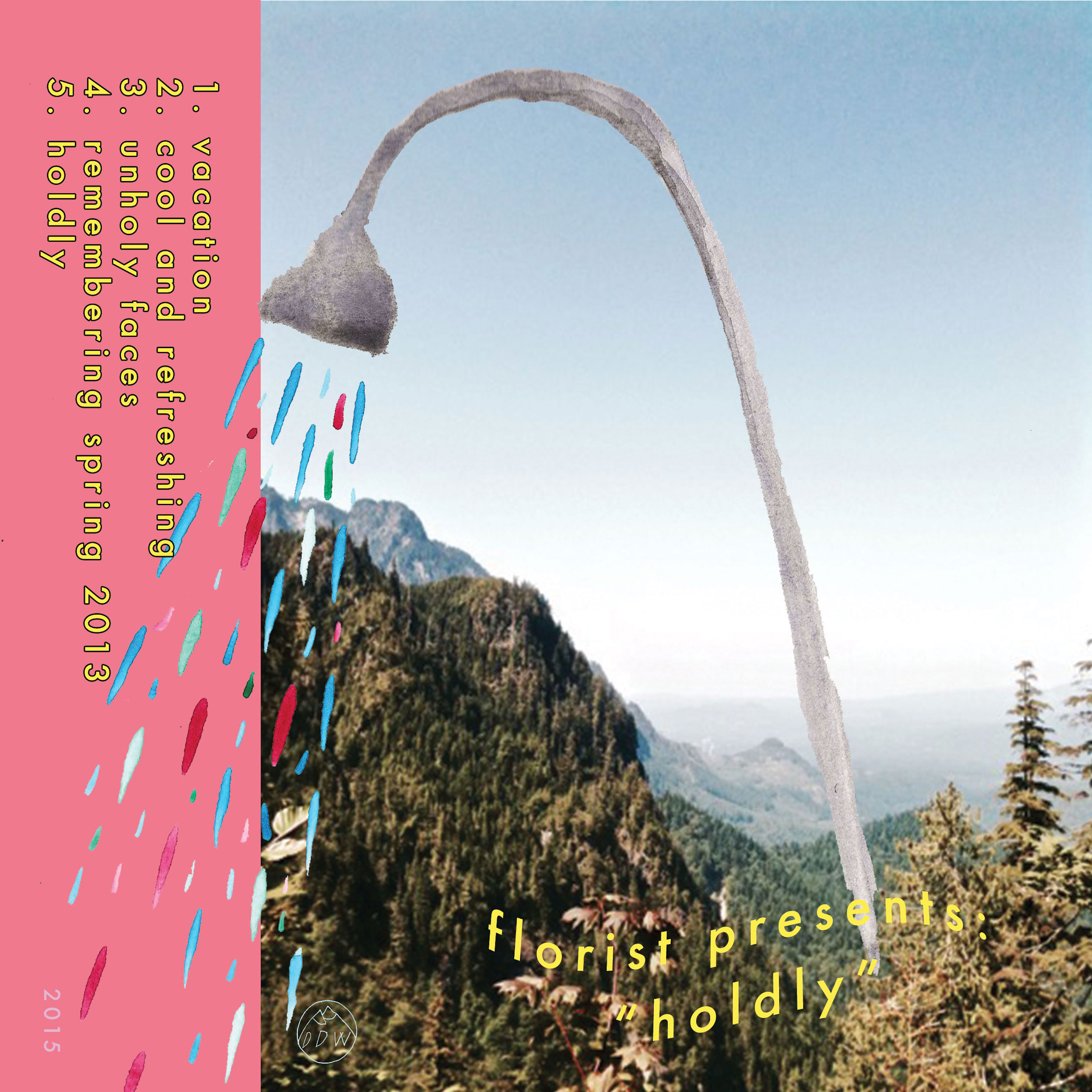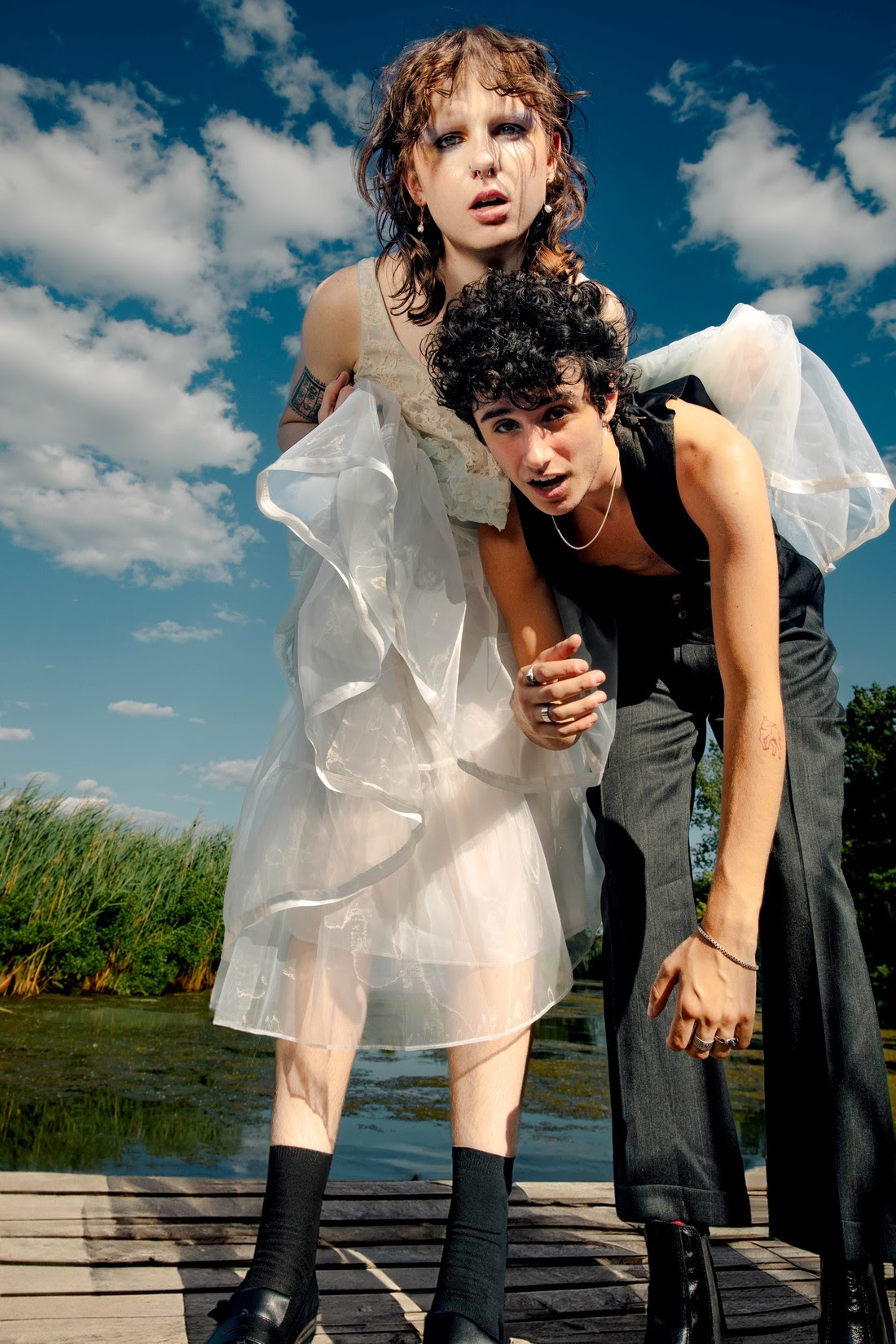Florist's music centers on moments of specific intimacy. "Hold me when I'm starting to cry," Emily Sprague sings on "Holdly," the title track off the band's new EP. This lyric translates a universal desire into something precise and personal, a real feeling delivered with commanding impact even through hushed vocals. Unadorned, riveting lyrics like these are certainly a hallmark of the Epoch -- the dreamy folk-rock collective that Florist and Sprague are also affiliated with -- but Holdly moves by itself. It's just under 20 minutes of the sweetest melodies swimming with powerful, deeply existential reflections. On my favorite track from the release, "Cool And Refreshing," Sprague sings: "I'm trying to be fine but I lie / About the things I say will never die / Like memories, forgiveness and the light inside my eyes." Even while focusing on three elements that seem eternal, the song undercuts them from the start, promising their transience without a trace of bitterness. Holdly is continually coming to terms with the space between our desire for permanence and the inevitable slippage of time; these are mini-philosophical treatises nestled in carefully constructed folk-pop songs.
Sprague is the lyrical heart of Florist, but of equal importance to the group are Rick Spataro, Jonnie Baker, and Felix Walworth. This EP is a collection of their newest songs, and serves as a precursor to their full-length debut, The Birds Outside Sang, which will be released via Double Double Whammy in early 2016. That record was originally slated for release this month, but vinyl pressing issues -- a frequent issue of late for smaller independent labels -- delayed it. In this situation, though, it's a case of frustrating circumstances yielding even better results: Holdly is the ideal introduction for a quiet, intricate band who write songs of this weight. Whether Sprague is reminiscing about the thrilling cold creeks of a Catskills childhood or confronting the puzzle of existence, Holdly condenses plenty of enormous ideas and emotions into a distinct, five-song thesis for the band.
Prior to Florist, Sprague wrote and recorded plenty of solo work, and released a series of solitary bedroom-recorded EPs to Bandcamp. These exist independently from Florist, but obviously share common threads and themes. Sprague grew up in the midst of the Catskill mountains, upstate in New York's rural and sometimes isolating Hudson Valley, specifically in Palenville, a town that has close ties to folk outsiders like AA Bondy and the Felice Brothers. Deeply influenced by that scene, in high school Sprague also became intensely fascinated with the process of recording music, a self-described obsession that extended well past those initial bedroom recordings. After graduating high school early, Sprague moved to Albany, NY, drawn mostly to the artistic community there. In Albany, Sprague met Spataro and Baker and the underlying friendship between that trio -- and Walworth who was a late but pivotal addition -- is the foundation for Florist's creative process. Their connection in Albany led the group on tour, and then, eventually, to Brooklyn where they now live, and where they recorded this EP and their debut album. An initial Florist EP called We Had Been This Way Forever came out in spring of 2013, but Holdly marks their first official release for Double Double Whammy. Today, we're premiering "Vacation," the first track off Holdly, along with an interview highlighting Sprague and Florist as a Band To Watch.
STEREOGUM: What initially prompted you to leave Palenville and move to Albany after you finished high school?
SPRAGUE: I moved up there to be with a few different people for music reasons, like to be a part of that creative community. I had friends up there, and that's where I met Rick and Jonnie, who are the two other big parts of Florist, the project. I moved there when I was about 17 -- well, like a month or two after moving I turned 18. I'm 21 now. But we recorded our first Florist EP in 2013, and the following spring we were playing shows up there. We went on tour for the first time with Lizard Kisses. That was my first-ever tour, and I was so amazed that people like those folks existed. I was introduced to Brooklyn and people down here through Marc Merza and Cory Siegler from Lizard Kisses.
STEREOGUM: Is that when you decided to move to Brooklyn from Albany?
SPRAGUE: I moved down here about two years ago to be around my friends that are in Eskimeaux, Bellows, and Told Slant. I met them all through living, playing, and helping people books shows in Albany. Felix [Walworth, of Told Slant and Florist] and Oliver Kalb [of Bellows] were at Bard College at the time and wanted to play a show in Albany. They ended up playing with a friend of mine and become tour contacts. Maybe every six months we'd run into each other at a show, or be playing a show together, and one time it came up that we should go on a tour together. Like, "Felix should play drums in Florist." That was kind of how it came together, and then after that I decided to move down here because they all live down here.
STEREOGUM: What's it like being part of an artistic collective like The Epoch?
SPRAGUE: It's special for me because I'd never had a group of friends like that. Ever. Music for me was always a solitary thing. I was always by myself -- nobody heard my music. I put it online but there was no community where I grew up for that. And even when I moved to Albany it still wasn't necessarily the right fit for me. So it was incredible to meet those people and become such close friends with them at the age of 19. I realized this whole new life could exist for me, even as somebody that never really felt I had a community or people I could share what I was doing with. So that's what it is for me. The label of the collective and being a part of that is less what matters. Really all it is just a friendship, a collective kind of way of helping each other out. I also play in Told Slant, and we help each other record. That's really just what it is.
STEREOGUM: Did it change your songwriting and the way that you make music once you became a part of that?
SPRAGUE: I still have to write songs by myself. The songwriting process is the same, and I feel like that will never really change. It's usually very immediate. I'll write a song on guitar or on keyboard but it has to be the right fit. It has to feel good once I start or I'm never gonna pick it up again or finish it. My mom's a musician, a music therapist actually, and taught me some piano when I very, very little. Then I took guitar lessons when I was 12 for a few years on and off. I thought I wanted to learn how to play an instrument, but what I realized is, I don't actually play any instruments. I think I just use them. It's just a tool. But every song I write, I'll start saying something -- and that match between how the music sounds and what the lyrics are, that's the most important things. But recording it is my favorite thing. I'm totally obsessed with recording. I'm a gear nerd and I'm always trying to get the best-sounding thing or a different-sounding thing. So are Rick and Jonnie. So we kind of go off on each other and it's this constant flow.
STEREOGUM: That's such an interesting perspective: to hear you say you just use the instruments as opposed to playing them. But the other thing about Florist I'm really drawn to is your lyrics, because they are so intimate and so specific.
SPRAGUE: My goal is to make them as immediate as possible. I don't talk in a lot of riddles. I'm mostly thinking about stuff that sounds beautiful. If you imagine what a phrase looks like -- if it looks beautiful -- that's usually what I'm trying to do. Then I match it with whatever sounds are happening, so you get a full picture. And it's not just a feeling, but also sort of an image that you can't see.
STEREOGUM: Since we are premiering "Vacation," let's talk about that one. It's such a specific childlike memory of how vacation seemed as a kid instead of this idealized adult view. When you're writing about how when you're little the only thing that matters is does the place we're going have a pool? I remember that so vividly, too. I didn't care where we were. I was with my family, and the only other thing that mattered to me at all is if there was a pool -- if I could swim.
SPRAGUE: I find myself thinking about childhood a lot in that way. On the full-length that's gonna come out next year there are a lot of lyrics about childhood that are rethinking what things actually meant. What does it actually mean to really want a swimming pool in your hotel? What does it really mean to be an adult ... and just not care about that at all, really? What does it mean to even have that as a memory? I like the idea of growing up and all the emotions around it. I don't think of myself as somebody who's trying to speak to an audience that's growing up or anything like that. But I feel that any of the emotions you have in childhood can still be used as an adult. It's a kind of life mentality.
STEREOGUM: Some of those ideas are also in the songs you wrote for the 6 Days Of Songs project from last year. Can you talk about that EP a little bit?
SPRAGUE: That was one of first new things I had done in a long time musically. I moved to Brooklyn in the fall of 2013 and then in February 2014 I was in a really bad bike accident. A lot of the full-length is about that. I broke my neck and my arm got run over...
STEREOGUM: You broke your neck?
SPRAGUE: Yes. This was like a really insane and extreme thing that happened to me. That happened in February 2014 and the 6 Days EP was in May, so it was the first time that I was able to play guitar. Because this arm was very very broken, and I couldn't -- well I had nerve damage and stuff -- so I couldn't hold the guitar neck. I couldn't move any of my fingers for a really long time. So those five or six songs were just the first songs I had written after moving to the city, moving to my first apartment in the city, getting hit by a truck, recovering, and then trying to play music again. So that's why it wasn't a proper Florist thing with Rick and Jonnie, because I was like I just need to do this. And that's been the only thing out for a while. So I'm really excited to finally have this new EP and album, more fuller representations of what Florist has always been about.
STEREOGUM: What do you think about the concept of "twee," and people who use that word in relation to music like what you make? Sometimes I think the word comes off as a sort of diminutive thing used in this weird, dismissive way, but it also describes a quality sonically. Do you think it applies?
SPRAGUE: I'm a little bit suspicious of it just being a buzz word. Is twee supposed to be describing the music sound, or the lyrics, or the overall aesthetic? I guess I would like to not be genre'd as twee because there's something about it that has always felt very lighthearted. And I feel like I would be offended if anybody ever thought of my music as light. I know that it is not light. A huge part of music for me is really intense, emotional listening. I identify with folk, but not twee. I feel like twee focuses more on an image of cuteness. Which I don't. I could be at a show and somebody could come up to me and say, "Oh wow, you look so cute." Or like, "I love your socks." But that's not what my music sounds like. I don't want the project to be confused with that aesthetic. I do the artwork for Florist, too, and I have a really strong aesthetic. I do love design and I want to do it all myself because I love doing art in that way. But I'm not trying to make it look like anything that's going to make somebody think of a certain genre.
Here's the album artwork and full Holdly tracklist:

01 "Vacation"
02 "Cool and Refreshing"
03 "Unholy Faces"
04 "Remembering Spring 2013"
05 "Holdly"
Holdly is out 10/30 via Double Double Whammy. Pre-order it here.






